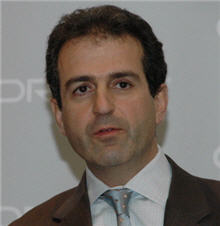Oracle offers a peek at social apps and Fusion

Oracle showed how it is bringing a social dimension into its software and offered a peek at Fusion applications this afternoon at Oracle OpenWorld. It demonstrated that Oracle has fully grokked the concepts and technologies of Web 2.0 and that Fusion apps, built on the evolving Fusion Middleware stack, are at least not just slideware.

"If you are trying to close a sales deal, you form communities, finds references in the customers base, go to a business partner and bring them into the opportunity and get product people involved. That social aspect is not well modeled in systems today. A lot is done over email," he said.
Anthony Lye, senior vice president of Oracle CRM OnDemand, demoed tools for sales people and an information library with a social flavor. Most of the features, such as gadgets, are not breakthrough or unique to Oracle, but the contextual implementation wins points. Following are some fuzzy photos from the presentation.
Steve Miranda, senior vice president of applications, gave a brief peek at a Fusion application and outlined the core design principles (below). The applications will be role-based and apply self-service user configuration via the Web, making the software palatable to both casual and sophisticated users, Miranda said.
Oracle is also supporting Google's OpenSocial APIs, which will allow applications to tap into into a sales group, for example. Abbo was joined on stage by Vic Gundotra, head of Google's developer programs, who shared with the audience that his company is an Oracle customer for some back office applications, such as financials and manufacturing.
It's unclear when those new applications will become available.
During a press conference, said Chuck Rozwat said, "The dates for shipping the first parts of Fusion in 2008 is still our plan." Abbo told me that the social software application previewed would ship sometime next year. He also intimated that Larry Ellison would reveal more about the social applications during his keynote on Wednesday.
Fusion Middleware 11g is shipping in calendar year 2008, said Thomas Kurian, senior vice president of Oracle Server Technologies. He allowed that a developer preview would be available in the middle of next month.
Oracle officials prefer to remain vague about when these technologies will actually ship, citing some regulations that don't allow the company to offer more specific timetables. Perhaps those regulations are internal to Oracle.
Rozwat was asked about the departure of John Wookey, who was running the Fusion applications project. "Wookey's departure was a function of a reorganization," Rozwat said. "We thought the development group should be organized a certain way and John felt there wasn't a role for him."